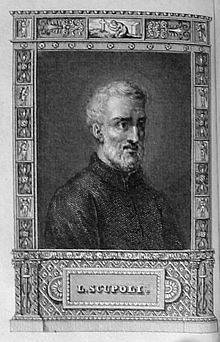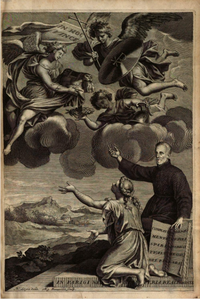Lorenzo Scupoli
Lorenzo Scupoli | |
|---|---|
 Image of Lorenzo Scupoli, from an 1810 French translation of The Spiritual Combat | |
| Born | Francesco Scupoli c. 1530 |
| Died | 26 November 1610 (aged 79–80) |
Francesco Scupoli
Life
Scupoli was born in
Scupoli moved to
Scupoli died on 26 November 1610 in Naples.[1]
The Spiritual Combat

While living in
The book was immediately popular, being republished nearly 60 times during Scupoli's lifetime and was translated into dozens of languages, including
Scupoli's original book is highly condensed, and assumes the reader has a certain moral and theological outlook. So a commentary may help modern readers benefit from the work.[3] In the 18th century, Nicodemus the Hagiorite translated the book to Greek, adapting it for the benefit of orthodox readers, and merging it with Scupoli's shorter Path to Paradise. This new version was published as Unseen Warfare. In the 19th century, the work was further revised by Russian monk Theophan the Recluse, and was again published as Unseen Warfare.[4]
References
Notes
Citations
- ^ OCLC 883370.
- ^ ISBN 9783110364866.
- ISBN 9780898709308.
- ^ "Review of Unseen Warfare, being the Spiritual Combat and Path to Paradise of Lorenzo Scupoli by Nicodemus of the Holy Mountain, Theophan the Recluse, E. Kadloubovsky, G. E. H. Palmer, H. A. Hodges, by Donald Attwater, Life of the Spirit (1946-1964), vol. 7, no. 73, 1952, pp. 32-34. JSTOR, Accessed 29 December 2023
External links
- Vanni, Andrea (2018). "SCUPOLI, Francesco". ISBN 978-8-81200032-6.
- The Spiritual Combat in the original language (in Italian)
- The Spiritual Combat in English
- The Spiritual Combat in French
- Works by Lorenzo Scupoli at LibriVox (public domain audiobooks)

